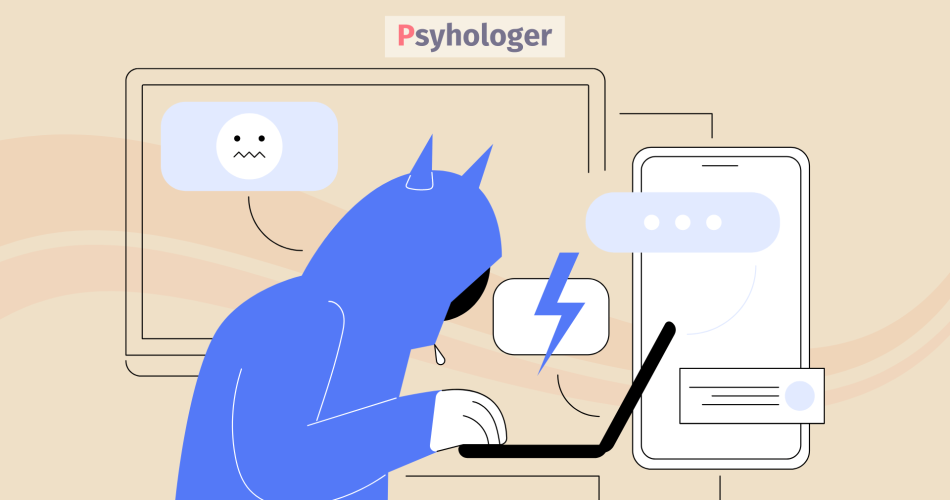The internet has created a time of unprecedented global connectivity, opening up incredible opportunities for socialization, education, and growth. However, this technology is not without its significant number of negative aspects and obstacles. One of the pressing issues of the digital age is online trolling, which is generally defined as the intentional and malicious disruption of online discourse through senseless arguments, the use of hateful or provocative language, and the general spread of chaos on the internet.
According to the theory of Bingham and Souza (2009)1, a unique characteristic of human beings is their ability to throw small objects with extraordinary accuracy and force over long distances. This is an anatomical capability of humans that even their closest relatives, chimpanzees, do not possess. This ability, combined with strong social cooperation, allowed humans to successfully manage evolutionary “conflicts of interest” that inevitably arise in every species on Earth due to limited resources.
In ancient scenarios, when a physically powerful peer attempted to claim more resources for themselves, the physically weaker members of the group could band together and pelt the cheater with stones. The key argument is that throwing stones from a distance is easier and less dangerous for survival than directly fighting the cheater, and a group of people can throw stones simultaneously, increasing the threat.
The word “troll” originates from an Old Norse word meaning “monster” or “fiend.” Research has shown that online trolling often correlates with the Dark Triad personality traits: narcissism, Machiavellianism, and psychopathy. Additionally, studies have shown that men are more likely to engage in trolling than women.2 Men also tend to view trolling as functional behavior, meaning they believe it has a purpose beyond mere amusement.
Research has shown that trolling is often a group activity, with the trolling community likely to stigmatize solo trolls. Some researchers have even begun to suggest the existence of an unofficial “trolling network,” implying that trolls are usually aware of other trolls occupying the same regions of cyberspace and can team up for joint attacks.
A new study conducted in 20243, involving 180 participants, aimed to develop an evolutionary understanding of online trolls using Bingham and Souza’s theoretical framework on the use of distance to project coercive threat. If online trolls are a modern version of ancient stone-throwers who attempt to conduct remote attacks to level the playing field, they should exhibit certain characteristics. For instance, one might expect them to have a higher number of long-term social estrangements and a fast life strategy, reflecting their limited access to resources and stressful conditions.
Social estrangements (or social ruptures) are situations where two people who previously had pleasant relationships completely sever those relationships. They no longer communicate and do not plan to restore the relationship in the future. For example, this could be an old friend with whom you had a falling out and no longer speak, or a relative with whom you lost contact due to conflict.
A fast life strategy (or fast life history strategy) is a concept that describes how a person adapts to their environment, particularly its stability and resource availability. A fast life strategy is characterized by prioritizing rapid reproduction and paying less attention to long-term plans and investments in the future.
People with a fast life strategy typically:
- Grew up in unpredictable and harsh conditions.
- Had limited access to resources.
- Are more likely to take risky decisions.
- Focus on short-term gains.
In the context of the study, this means that online trolls may be more socially isolated and adapted to conditions where resources are limited, and long-term plans are of little importance. Such isolation and stressful conditions may contribute to their seeking entertainment and satisfaction through online trolling.
Results
The study found that trolling behavior, although weakly, does correlate with the Dark Triad traits and negatively correlates with social support. At the same time, there were no significant correlations between trolling behavior and the number of social estrangements or life strategy.
The study confirmed the association between online trolling and the Dark Triad traits, as well as showed that men are more likely to engage in trolling than women. A novel finding was that the strength of social support negatively correlates with trolling behavior. This may indicate that people who lack social support are more likely to engage in trolling.
Trolling behavior will become increasingly complex with the development of technology. It is possible that understanding ancient human behavior will help better comprehend how malicious and deviant behavior manifests online.
